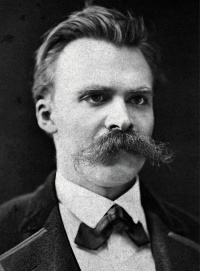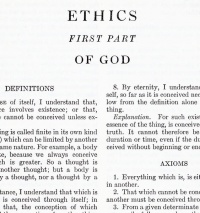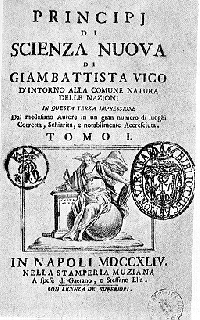Philosophy
From The Art and Popular Culture Encyclopedia

|
"(Philosophy is) the yelping hound howling at her lord (poetry) [...] " --Plato, The Republic "La philosophie doit tout dire" --Sade, Juliette "Nothing is more usual than for philosophers to encroach on the province of grammarians, and to engage in disputes of words, while they imagine they are handling controversies of the deepest importance and concern." - David Hume "These three masters of suspicion [Marx, Nietzsche and Freud] are not to be misunderstood, however, as three masters of skepticism. They are, assuredly, three great “destroyers.”[...] All three clear the horizon for a more authentic word, for a new reign of Truth." --Freud and Philosophy' (1965) by Paul Ricœur. When Plato was discoursing about his "ideas," and using the nouns "tableness" and "cupness;" "I, O Plato!" interrupted Diogenes, "see a table and a cup, but I see no tableness or cupness." Plato made answer, "That is natural enough, for you have eyes, by which a cup and a table are contemplated; but you have not intellect, by which tableness and cupness are seen." --Lives and Opinions of Eminent Philosophers |



,_Utriusque_cosmic_maioris_scilicet_et_minoris_metaphysica.jpg)
Illustration: Diagram of the human mind, from Utriusque cosmi maioris scilicet et minoris metaphysica by Robert Fludd
|
Related e |
|
Featured: |
Philosophy is the study of general and fundamental problems, such as those connected with reality, existence, knowledge, values, reason, mind, and language. Philosophy is distinguished from other ways of addressing such problems by its critical, generally systematic approach and its reliance on rational argument. In more casual speech, by extension, "philosophy" can refer to the most basic belief system of an individual or group.
The word "philosophy" comes from the Ancient Greek φιλοσοφία (philosophia), which literally means "love of wisdom". The introduction of the terms "philosopher" and "philosophy" has been ascribed to the Greek thinker Pythagoras.
Contents |
History
Many societies have considered philosophical questions and built philosophical traditions based upon each other's works.
Eastern philosophy is organized by the chronological periods of each region. Historians of western philosophy usually divide the subject into three or more periods, the most important being ancient philosophy, medieval philosophy, and modern philosophy.
Areas of inquiry
Philosophy is divided into many sub-fields. These include epistemology, logic, metaphysics, ethics, and aesthetics. Some of the major areas of study are considered individually below.
Epistemology
Epistemology is concerned with the nature and scope of knowledge, such as the relationships between truth, belief, and theories of justification.
Skepticism is the position which questions the possibility of completely justifying any truth. The regress argument, a fundamental problem in epistemology, occurs when, in order to completely prove any statement P, its justification itself needs to be supported by another justification. This chain can do three possible options, all of which are unsatisfactory according to the Münchhausen trilemma. One option is infinitism, where this chain of justification can go on forever. Another option is foundationalism, where the chain of justifications eventually relies on basic beliefs or axioms that are left unproven. The last option, such as in coherentism, is making the chain circular so that a statement is included in its own chain of justification.
Rationalism is the emphasis on reasoning as a source of knowledge. Empiricism is the emphasis on observational evidence via sensory experience over other evidence as the source of knowledge. Rationalism claims that every possible object of knowledge can be deduced from coherent premises without observation. Empiricism claims that at least some knowledge is only a matter of observation. For this, Empiricism often cites the concept of tabula rasa, where individuals are not born with mental content and that knowledge builds from experience or perception. Epistemological solipsism is the idea that the existence of the world outside the mind is an unresolvable question.
Parmenides (fl. 500 BC) argued that it is impossible to doubt that thinking actually occurs. But thinking must have an object, therefore something beyond thinking really exists. Parmenides deduced that what really exists must have certain properties—for example, that it cannot come into existence or cease to exist, that it is a coherent whole, that it remains the same eternally (in fact, exists altogether outside time). This is known as the third man argument. Plato (427–347 BC) combined rationalism with a form of realism. The philosopher's work is to consider being, and the essence (ousia) of things. But the characteristic of essences is that they are universal. The nature of a man, a triangle, a tree, applies to all men, all triangles, all trees. Plato argued that these essences are mind-independent "forms", that humans (but particularly philosophers) can come to know by reason, and by ignoring the distractions of sense-perception.
Modern rationalism begins with Descartes. Reflection on the nature of perceptual experience, as well as scientific discoveries in physiology and optics, led Descartes (and also Locke) to the view that we are directly aware of ideas, rather than objects. This view gave rise to three questions:
- Is an idea a true copy of the real thing that it represents? Sensation is not a direct interaction between bodily objects and our sense, but is a physiological process involving representation (for example, an image on the retina). Locke thought that a "secondary quality" such as a sensation of green could in no way resemble the arrangement of particles in matter that go to produce this sensation, although he thought that "primary qualities" such as shape, size, number, were really in objects.
- How can physical objects such as chairs and tables, or even physiological processes in the brain, give rise to mental items such as ideas? This is part of what became known as the mind-body problem.
- If all the contents of awareness are ideas, how can we know that anything exists apart from ideas?
Descartes tried to address the last problem by reason. He began, echoing Parmenides, with a principle that he thought could not coherently be denied: I think, therefore I am (often given in his original Latin: Cogito ergo sum). From this principle, Descartes went on to construct a complete system of knowledge (which involves proving the existence of God, using, among other means, a version of the ontological argument). His view that reason alone could yield substantial truths about reality strongly influenced those philosophers usually considered modern rationalists (such as Baruch Spinoza, Gottfried Leibniz, and Christian Wolff), while provoking criticism from other philosophers who have retrospectively come to be grouped together as empiricists.
Logic
Logic is the study of the principles of correct reasoning. Arguments use either deductive reasoning or inductive reasoning. Deductive reasoning is when, given certain statements (called premises), other statements (called conclusions) are unavoidably implied. Rules of inferences from premises include the most popular method, modus ponens, where given “A” and “If A then B”, then “B” must be concluded. A common convention for a deductive argument is the syllogism. An argument is termed valid if its conclusion does indeed follow from its premises, whether the premises are true or not, while an argument is sound if its conclusion follows from premises that are true. Propositional logic uses premises that are propositions, which are declarations that are either true or false, while predicate logic uses more complex premises called formulae that contain variables. These can be assigned values or can be quantified as to when they apply with the universal quantifier (always apply) or the existential quantifier (applies at least once). Inductive reasoning makes conclusions or generalizations based on probabilistic reasoning. For example, if “90% of humans are right-handed” and “Joe is human” then “Joe is probably right-handed”. Fields in logic include mathematical logic (formal symbolic logic) and philosophical logic.
Metaphysics
Metaphysics is the study of the most general features of reality, such as existence, time, the relationship between mind and body, objects and their properties, wholes and their parts, events, processes, and causation. Traditional branches of metaphysics include cosmology, the study of the world in its entirety, and ontology, the study of being.
Within metaphysics itself there are a wide range of differing philosophical theories. Idealism, for example, is the belief that reality is mentally constructed or otherwise immaterial while realism holds that reality, or at least some part of it, exists independently of the mind. Subjective idealism describes objects as no more than collections or "bundles" of sense data in the perceiver. The 18th century philosopher George Berkeley contended that existence is fundamentally tied to perception with the phrase Esse est aut percipi aut percipere or "To be is to be perceived or to perceive".
In addition to the aforementioned views, however, there is also an ontological dichotomy within metaphysics between the concepts of particulars and universals as well. Particulars are those objects that are said to exist in space and time, as opposed to abstract objects, such as numbers. Universals are properties held by multiple particulars, such as redness or a gender. The type of existence, if any, of universals and abstract objects is an issue of serious debate within metaphysical philosophy. Realism is the philosophical position that universals do in fact exist, while nominalism is the negation, or denial of universals, abstract objects, or both. Conceptualism holds that universals exist, but only within the mind's perception.
The question of whether or not existence is a predicate has been discussed since the Early Modern period. Essence is the set of attributes that make an object what it fundamentally is and without which it loses its identity. Essence is contrasted with accident: a property that the substance has contingently, without which the substance can still retain its identity.
Moral and political philosophy
Ethics, or "moral philosophy," is concerned primarily with the question of the best way to live, and secondarily, concerning the question of whether this question can be answered. The main branches of ethics are meta-ethics, normative ethics, and applied ethics. Meta-ethics concerns the nature of ethical thought, such as the origins of the words good and bad, and origins of other comparative words of various ethical systems, whether there are absolute ethical truths, and how such truths could be known. Normative ethics are more concerned with the questions of how one ought to act, and what the right course of action is. This is where most ethical theories are generated. Lastly, applied ethics go beyond theory and step into real world ethical practice, such as questions of whether or not abortion is correct. Ethics is also associated with the idea of morality, and the two are often interchangeable.
One debate that has commanded the attention of ethicists in the modern era has been between consequentialism (actions are to be morally evaluated solely by their consequences) and deontology (actions are to be morally evaluated solely by consideration of agents' duties, the rights of those whom the action concerns, or both). Jeremy Bentham and John Stuart Mill are famous for propagating utilitarianism, which is the idea that the fundamental moral rule is to strive toward the "greatest happiness for the greatest number". However, in promoting this idea they also necessarily promoted the broader doctrine of consequentialism. Adopting a position opposed to consequentialism, Immanuel Kant argued that moral principles were simply products of reason. Kant believed that the incorporation of consequences into moral deliberation was a deep mistake, since it denies the necessity of practical maxims in governing the working of the will. According to Kant, reason requires that we conform our actions to the categorical imperative, which is an absolute duty. An important 20th-century deontologist, W.D. Ross, argued for weaker forms of duties called prima facie duties.
More recent works have emphasized the role of character in ethics, a movement known as the aretaic turn (that is, the turn towards virtues). One strain of this movement followed the work of Bernard Williams. Williams noted that rigid forms of consequentialism and deontology demanded that people behave impartially. This, Williams argued, requires that people abandon their personal projects, and hence their personal integrity, in order to be considered moral. G.E.M. Anscombe, in an influential paper, "Modern Moral Philosophy" (1958), revived virtue ethics as an alternative to what was seen as the entrenched positions of Kantianism and consequentialism. Aretaic perspectives have been inspired in part by research of ancient conceptions of virtue. For example, Aristotle's ethics demands that people follow the Aristotelian mean, or balance between two vices; and Confucian ethics argues that virtue consists largely in striving for harmony with other people. Virtue ethics in general has since gained many adherents, and has been defended by such philosophers as Philippa Foot, Alasdair MacIntyre, and Rosalind Hursthouse.
Political philosophy is the study of government and the relationship of individuals (or families and clans) to communities including the state. It includes questions about justice, law, property, and the rights and obligations of the citizen. Politics and ethics are traditionally inter-linked subjects, as both discuss the question of what is good and how people should live.
From ancient times, and well beyond them, the roots of justification for political authority were inescapably tied to outlooks on human nature. In The Republic, Plato presented the argument that the ideal society would be run by a council of philosopher-kings, since those best at philosophy are best able to realize the good. Even Plato, however, required philosophers to make their way in the world for many years before beginning their rule at the age of fifty. For Aristotle, humans are political animals (i.e. social animals), and governments are set up to pursue good for the community. Aristotle reasoned that, since the state (polis) was the highest form of community, it has the purpose of pursuing the highest good. Aristotle viewed political power as the result of natural inequalities in skill and virtue. Because of these differences, he favored an aristocracy of the able and virtuous. For Aristotle, the person cannot be complete unless he or she lives in a community. His The Nicomachean Ethics and The Politics are meant to be read in that order. The first book addresses virtues (or "excellences") in the person as a citizen; the second addresses the proper form of government to ensure that citizens will be virtuous, and therefore complete. Both books deal with the essential role of justice in civic life.
Nicolas of Cusa rekindled Platonic thought in the early 15th century. He promoted democracy in Medieval Europe, both in his writings and in his organization of the Council of Florence. Unlike Aristotle and the Hobbesian tradition to follow, Cusa saw human beings as equal and divine (that is, made in God's image), so democracy would be the only just form of government. Cusa's views are credited by some as sparking the Italian Renaissance, which gave rise to the notion of "Nation-States".
Later, Niccolò Machiavelli rejected the views of Aristotle and Thomas Aquinas as unrealistic. The ideal sovereign is not the embodiment of the moral virtues; rather the sovereign does whatever is successful and necessary, rather than what is morally praiseworthy. Thomas Hobbes also contested many elements of Aristotle's views. For Hobbes, human nature is essentially anti-social: people are essentially egoistic, and this egoism makes life difficult in the natural state of things. Moreover, Hobbes argued, though people may have natural inequalities, these are trivial, since no particular talents or virtues that people may have will make them safe from harm inflicted by others. For these reasons, Hobbes concluded that the state arises from a common agreement to raise the community out of the state of nature. This can only be done by the establishment of a sovereign, in which (or whom) is vested complete control over the community, and is able to inspire awe and terror in its subjects.
Many in the Enlightenment were unsatisfied with existing doctrines in political philosophy, which seemed to marginalize or neglect the possibility of a democratic state. Jean-Jacques Rousseau was among those who attempted to overturn these doctrines: he responded to Hobbes by claiming that a human is by nature a kind of "noble savage", and that society and social contracts corrupt this nature. Another critic was John Locke. In Second Treatise on Government he agreed with Hobbes that the nation-state was an efficient tool for raising humanity out of a deplorable state, but he argued that the sovereign might become an abominable institution compared to the relatively benign unmodulated state of nature.
Following the doctrine of the fact-value distinction, due in part to the influence of David Hume and his student Adam Smith, appeals to human nature for political justification were weakened. Nevertheless, many political philosophers, especially moral realists, still make use of some essential human nature as a basis for their arguments.
Marxism is derived from the work of Karl Marx and Friedrich Engels. Their idea that capitalism is based on exploitation of workers and causes alienation of people from their human nature, the historical materialism, their view of social classes, etc., have influenced many fields of study, such as sociology, economics, and politics. Marxism inspired the Marxist school of communism, which brought a huge impact on the history of the 20th century.
Aesthetics
Aesthetics deals with beauty, art, enjoyment, sensory-emotional values, perception, and matters of taste and sentiment.
Specialized branches
- Philosophy of language explores the nature, the origins, and the use of language.
- Philosophy of law (often called jurisprudence) explores the varying theories explaining the nature and the interpretations of the law in society.
- Philosophy of mind explores the nature of the mind, and its relationship to the body, and is typified by disputes between dualism and materialism. In recent years there has been increasing similarity between this branch of philosophy and cognitive science.
- Philosophy of religion
- Philosophy of science
- Metaphilosophy
Many academic disciplines have also generated philosophical inquiry. These include history, logic, and mathematics.
See also
- Analytic philosophy
- Anti-philosophy
- 19th century philosophy
- 20th century philosophy
- Continental philosophy
- Deaths of philosophers
- Desiring-production
- Embodied philosophy
- Epicureanism
- General economy
- Haecceity
- Hedonism
- Kant and Sade: The Ideal Couple by Zizek
- Lists of philosophers
- Major philosophical traditions
- Map–territory relation
- Postmodern philosophy
- Process philosophy
- Philosophy and literature
- Philosophy and film
- Political philosophy
- Philosophy in the Bedroom by Sade
- Twentieth-century French philosophy
- Theory
- Toilet philosophy
- Social theory
- Sophia
- Transcendentals
- Unsolved problems in philosophy
- Western philosophy
- The Philosophers' Football Match
By field
- Philosophy of language
- Philosophy of laughter
- Philosophy of religion
- Philosophy of sex
- Philosophy of horror





